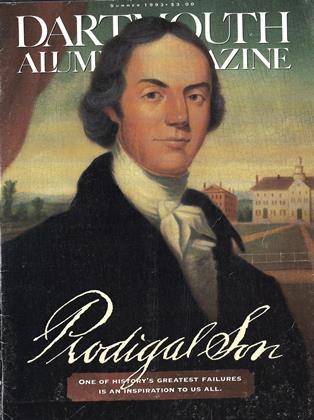The Presidential Lecture series celebrates the life of the mind, the excitement of intellectual interchange, and the disciplined pursuit of ideas that matter."
During my first year in Hanover, we inaugurated a new tradition at Dartmouth: a series of annual Presidential Lectures.
Established in 1987, the Presidential Lecture series is designed to recognize the contributions of members of the faculty to Dartmouth's academic excellence. On one afternoon each year, we ask a distinguished member of our faculty to deliver a public lecture that presents significant aspects of his or her scholarly work. We hope thereby to stimulate intellectual communication among the many disciplines that comprise the universe of learning.
The Presidential Lecture series is a celebration of the life of the mind. It celebrates the joy of research, the excitement of intellectual interchange, and the disciplined pursuit of ideas that matter. It celebrates the vital traditions of scholarship through which senior scholars inspire younger faculty members and students to make new contributions to that living body of knowledge from which all of us derive our strength.
The first annual Presidential Lecture was given by Walter H. Stockmayer, Albert W. Smith Professor of Chemistry Emeritus. Walter Stockmayer joined the Dartmouth faculty in 1961. He established a reputation as one of the world's leading physical chemists and was elected a member of the National Academy of Sciences. His lecture bore the suggestive title, "The Right Time: Polymers, People, and Priorities." In its spirit of adventure and challenge, in its sense of promise and destiny, "The Right Time" set a stirring direction for the Presidential Lecture series.
The second Presidential Lecture was delivered by Professor Errol G. Hill, Willard Professor of Drama and Oratory, a distinguished and prolific scholar who is also a playwright, actor, and director. His subject was "Cultural Identity and the Lively Arts: a Caribbean Perspective."
Professor Mary Kelley of the Department of History gave the third Presidential Lecture. Author or editor of four books, she is also the recipient of numerous awards, including the College's Distinguished Teaching Award in 1982. She spoke on '"Vindicating the Equality of Female Intellect': Women and Education in the New Nation."
Dr. John E. Wennberg, Professor of Community and Family Medicine, delivered the fourth Presidential Lecture in 1991. A distinguished physician, Dr. Wennberg has broken new ground in the evaluative clinical sciences and has helped to establish the new field of medical outcomes research. His lecture was entitled, "The Straggle for the Future of Medicine."
Last year Robert J. Fogelin, Sherman Fairchild Professor in the Humanities and Professor of Philosophy, honored us by delivering the fifth Presidential Lecture. Author of a number of important books in philosophy, on such subjects as Wittgenstein, Hume, and skepticism, Professor Fogelin is also a distinguished teacher who received the Devane Medal for Outstanding Teaching and Scholarship while on the faculty at Yale University. He spoke on "The Unsayable, the Unspeakable, and Silence."
Last spring the sixth Presidential Lecture was given by Blanche H. Gelfant, Professor of English. Professor Gelfant has written extensively on numerous twentieth-century American authors, contemporary women writers, and significant twentieth-century themes, including the American West and the American city. The title of her lecture was "What More Can Carrie Want?: The Literary Imagination and American Consumerism."
To date, then, the Presidential Lecturers have represented six different disciplines chemistry, drama, history, medicine, philosophy, and English. But in a sense, the Presidential Lecturers are emblematic of Dartmouth and the academy as a whole. They symbolize the fact that all Dartmouth faculty members belong to a single corporate body. That membership links them across disciplines to colleagues with diverse academic interests who share in the joy that comes from participation in an intellectual community. They share common goals, a common heritage, common standards, and common hopes.
And, just as the Presidential Lecture series serves to link each faculty member in the fellowship of this special academic community, it also suggests that Dartmouth is itself part of a larger community of learning in which we all hold membership and to which we all owe allegiance.
 View Full Issue
View Full Issue
More From This Issue
-
 Cover Story
Cover StoryThis Man Scanndalized Eleazar Wheelock
June 1993 By Jerold Wikoff -
 Feature
FeatureTHE PEMI AFFAIR
June 1993 By KIRK SIEGEL'82 -
 Feature
FeatureRescuing the Wisdom of Vanishing Tribes
June 1993 By Robert Eshman '82 -
 Feature
FeatureTrip to the sea
June 1993 By Will Lange -
 Feature
FeatureDoes a Bicycle Have a Soul?
June 1993 By Lee Michaelides -
 Article
ArticleDr. Wheelock's Journal
June 1993 By "E. Wheelock"
James O. Freedman
-
 Letters to the Editor
Letters to the EditorPresents Accounted For
June 1994 -
 Article
ArticleTHE SENSE OF PLACE
SEPTEMBER 1991 By James O. Freedman -
 Feature
FeatureHONEST TO GOD ACCOMMODATION
OCTOBER 1991 By JAMES O. FREEDMAN -
 Article
ArticleThe New Great Issues
OCTOBER 1994 By James O. Freedman -
 Article
ArticleEssayists and Solitude
November 1994 By James O. Freedman -
 Article
ArticleObligations of the Educated
September 1995 By James O. Freedman
Article
-
 Article
ArticleFOOTBALL
October, 1908 -
 Article
ArticleMenaker Memorial Fund
MAY 1968 -
 Article
ArticleGive a Rouse
JANUARY 1997 -
 Article
ArticleImprover
MARCH 1988 By Charles Wheelan ’88 -
 Article
ArticleClass Notes
Sept/Oct 2001 By Karin Goodfellow '01, DAN WOODFORD '97 -
 Article
ArticleGreater Boston Alumni Sample Florentine Culture
February 1974 By WALTERS. YUSEN '58


